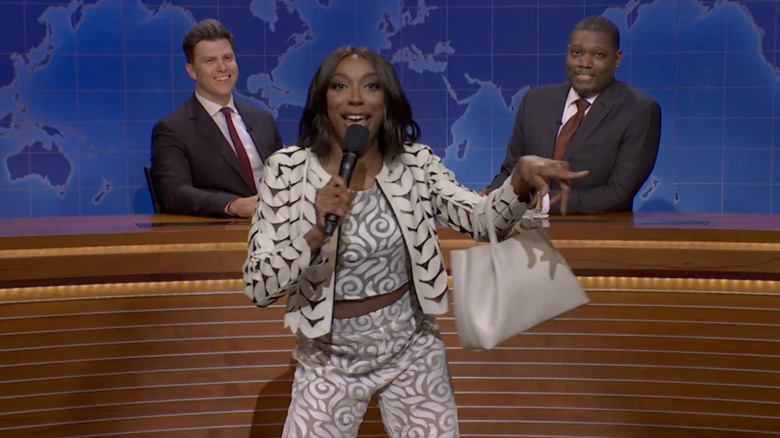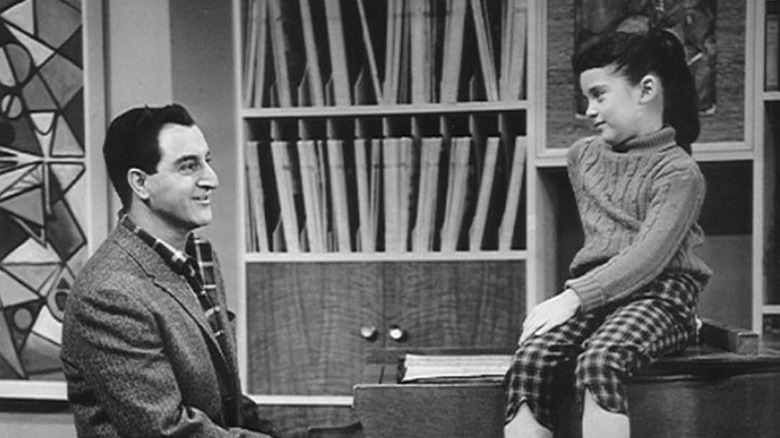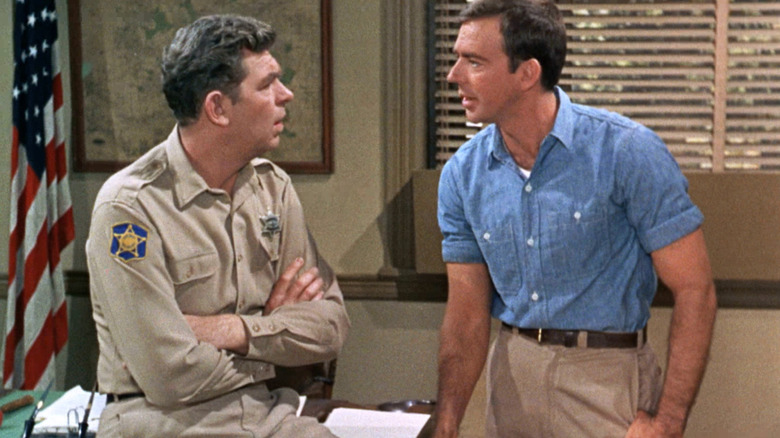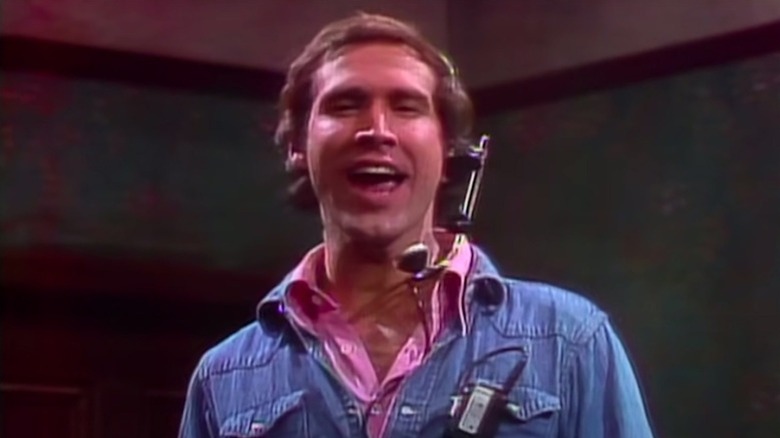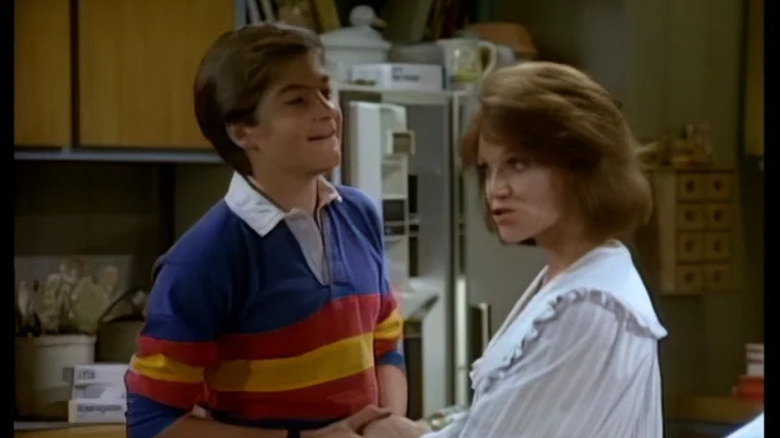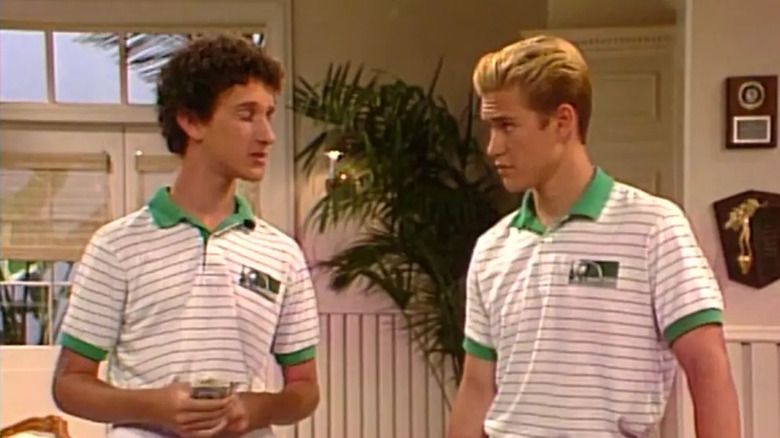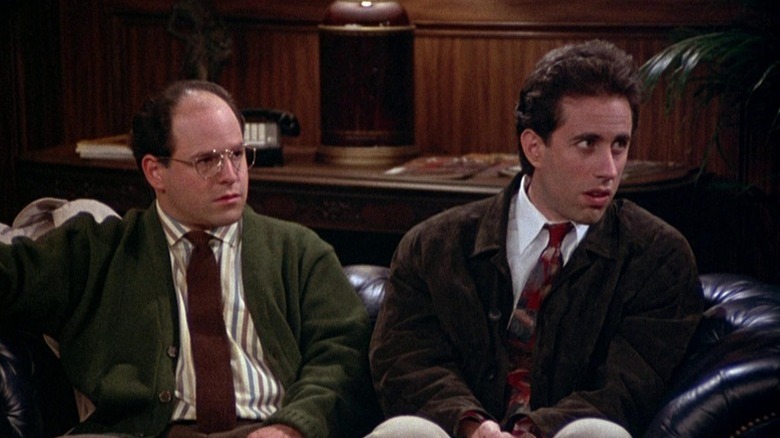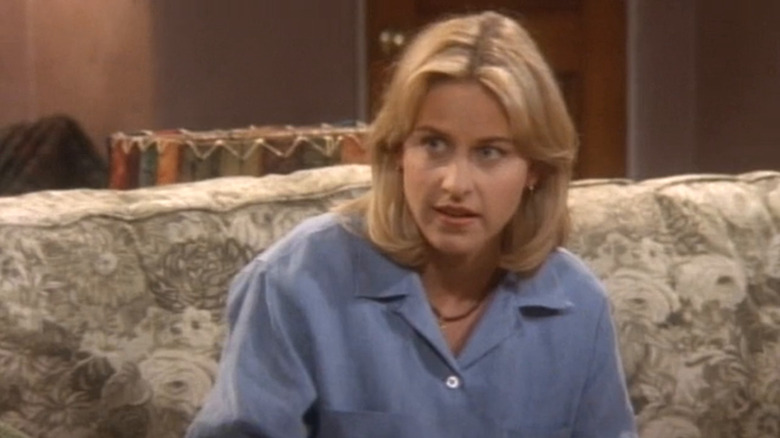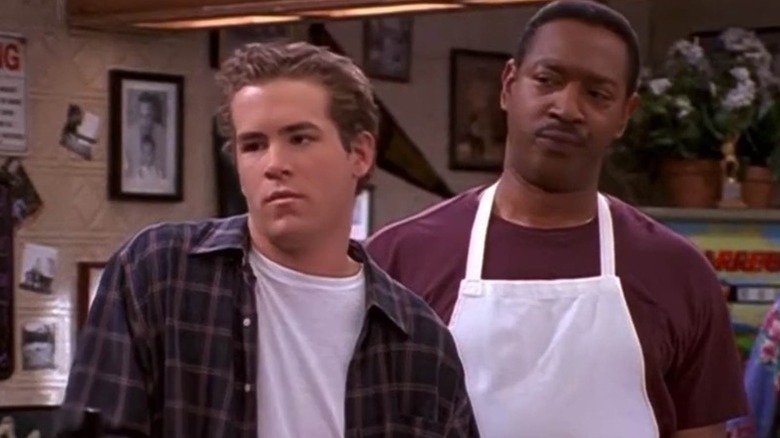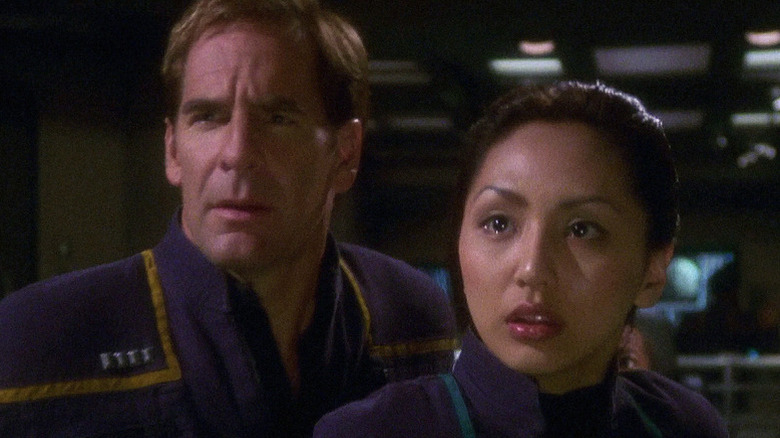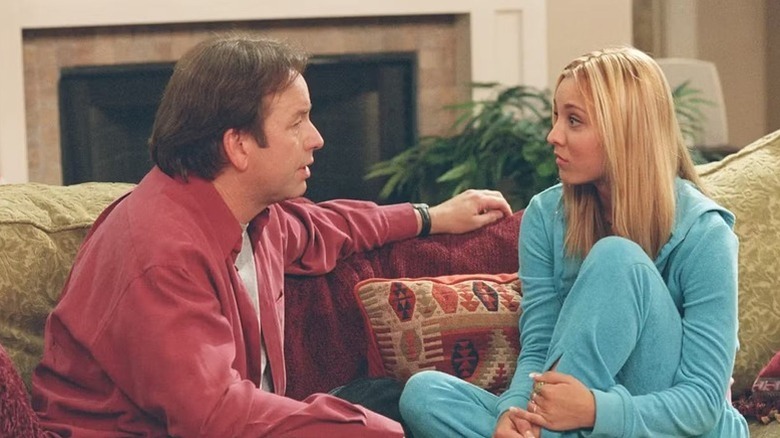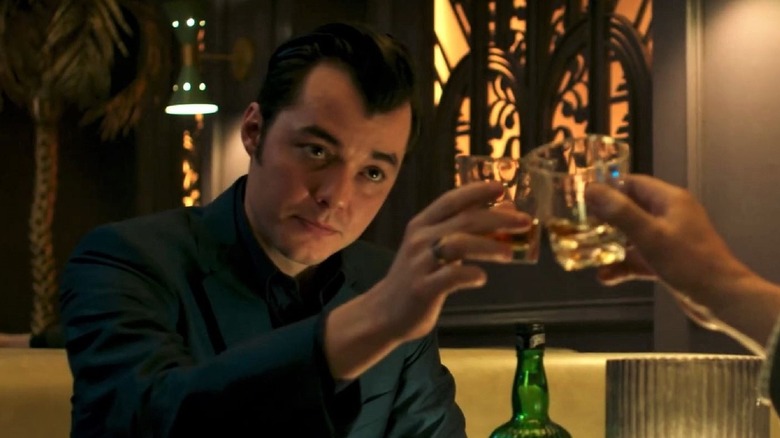TV Shows That Changed Their Titles
Television show titles are not necessarily permanent, but can formally change even after they've been introduced to the public. These post-premiere retitlings can come from mandates by the studio or network, or may reflect significant creative changes for the show since its launch. In fact, sometimes popular shows that have been on for years get rebranded to reinvigorate them and instill a fresh direction.
From shortening titles to completely changing up their names, there are quite a few major series that have altered their branding. Sometimes this change helped give a show its second wind and, in others, it failed to drive up viewership, leaving the name change short-lived. Keep in mind that this list does not include revival series that rebranded shows for their return after an extended hiatus, like "Daredevil: Born Again." Here are several popular TV shows that changed their titles after their differently branded premieres.
The Danny Thomas Show
The idea of shows changing their titles dates back to the earliest years of the medium, including the program '50s sitcom "The Danny Thomas Show." Debuting in 1953, the series set the template for family-based sitcoms to follow and enjoyed an impressive 11-season run. The show centered on Danny Thomas playing Danny Williams, a facsimile of himself, working as a successful nightclub entertainer. In the early seasons of the show, Williams' work often kept him away from his family, leaving the bulk of the parental responsibilities to his wife, Margaret (Jean Hagen).
For its first three seasons, the Thomas-led sitcom actually went by the title "Make Room for Daddy." Part of the reason for the name change going into the show's fourth season was the departure of Hagen, who left the series due to reported creative differences. The character of Margaret Williams was killed off-screen in between seasons, effectively making Danny Williams a single parent and the undisputed focal point. This increased focus led to the series being retitled to "The Danny Thomas Show" moving forward.
Mayberry R.F.D.
"The Andy Griffith Show" was a staple family sitcom for the bulk of the '60s, with its star playing small-town sheriff Andy Taylor. After eight seasons of television, Griffith decided to change up his career, leaving the show that made him a household name. However, "The Andy Griffith Show" was still a popular draw with audiences, and CBS decided to continue the series without its original star. With that in mind, the focus and rebranded title of the show reflected the community Taylor once protected: "Mayberry R.F.D."
To ease the transition, Griffith reprised his role as Taylor in the rebranded show's season premiere as his character married Helen Crump (Aneta Corsaut). Taylor would be a recurring presence throughout the season, but the character's focus was increasingly turning to his married life, phasing him out of the narrative. After Taylor and Crump moved to Charlotte, the show's new protagonist was widower Sam Jones (Ken Berry), raising his young son Mike (Buddy Foster), echoing Taylor's journey. "Mayberry R.F.D." ran for three seasons and maintained a strong viewership, but was canceled as CBS moved away from its rural-themed television programming.
Saturday Night Live
"Saturday Night Live" has been an American television institution since it premiered in 1975, but it didn't debut under that title. At the time, ABC had the similarly named "Saturday Night Live with Howard Cosell" program, though that was more of a traditional variety show. With the name taken by a rival network, "SNL" opted to go with "NBC's Saturday Night" throughout its first season. Interestingly, future "SNL" cast member Bill Murray was part of the "Howard Cosell" lineup after being cut from the first season of NBC's series at the very last minute.
In the middle of the first season of "SNL," ABC canceled Cosell's variety show, leaving the show's "Saturday Night Live" moniker available. With Michaels having wanted to name his show something to reflect its live television nature, the "Saturday Night Live" title was purchased by NBC.
The Hogan Family
Though perhaps not as widely remembered as its '80s contemporary sitcoms like "Growing Pains," the 1986 series "The Hogan Family" enjoyed a six-season run. However, the show also saw three title changes across its first three seasons, in part due to behind-the-scenes complications. The series initially focused on matriarch Valerie Hogan (Valerie Harper) as she raised three teenage sons while her husband was frequently out of town working as an airline pilot. Between the show's second and third seasons, Valerie was killed off-screen, with the character's sister-in-law Sandy Hogan (Sandy Duncan) replacing her as the family's surrogate maternal figure.
Capitalizing on its original star's prior sitcom success on "Rhoda," "The Hogan Family" was initially titled "Valerie" for its first season. This was expanded to "Valerie's Family: The Hogans" for the show's second season to emphasize the series' familial premise. Due to salary disputes, Harper was fired from the show after the second season. Reflecting the change in the series' protagonist, the show was renamed "The Hogan Family" for the remainder of its run.
Saved by the Bell
Few teen-led sitcoms better defined the early '90s than "Saved by the Bell," which premiered in 1989 and followed the adventures of the students at Bayside High School. Running on NBC, the show was actually a heavily retooled version of a Disney Channel series that debuted in 1988. Titled "Good Morning, Miss Bliss," the Disney series featured middle school teacher Carrie Bliss (Hayley Mills) leading a class of eighth graders. Among her precocious students are Zack Morris (Mark-Paul Gosselaar), Screech Powers (Dustin Diamond), and Lisa Turtle (Lark Voohies).
"Good Morning, Miss Bliss" was canceled after 13 episodes, reverting the rights to the show and its characters to NBC, which had produced the pilot episode. The network saw value in the younger characters of the short-lived series, deciding to rebuild the concept, albeit with Zack as its focal point. Premiering on NBC months after the show's cancellation on the Disney Channel, "Saved by the Bell" was a strong success. In subsequent syndication packages and home video releases, "Good Morning, Miss Bliss" was included, under the altered title "Saved by the Bell: The Junior High Years."
Seinfeld
"Seinfeld" is one of the defining sitcoms of the '90s, capturing the funny side of life's many eccentricities. When "Seinfeld" premiered in 1989, however, it did so under a slightly longer title than fans would become accustomed to.
Debuting under the title "The Seinfeld Chronicles," the Jerry Seinfeld-led sitcom was virtually unrecognizable compared to what would shortly follow. Though the friendship between Jerry and George Costanza (Jason Alexander) was present, the layout of the show's primary diner and apartment settings were significantly altered. The pilot episode also featured Michael Richards, but with his character having an alternate name that had to be retconned later. By its second episode, which aired the following year, the sitcom's title was trimmed to the more succinct "Seinfeld," and the rest is television history.
Ellen
Long before she was hosting daytime talk shows or the Academy Awards, Ellen DeGeneres starred in her own ABC sitcom. Running for five seasons from 1994 to 1998, "Ellen" had DeGeneres play Ellen Morgan, a 30-something bookstore owner. The show featured a landmark television moment of Ellen coming out as gay during its fourth season, reflecting DeGeneres' own public acknowledgment of her sexuality. However, while DeGeneres became a household name, "Ellen" was initially broadcast under a different name entirely.
For its first season, DeGeneres' show was titled "These Friends of Mine," but changed its title to "Ellen" starting with the second season. This was done to avoid confusion with NBC's sitcom "Friends," which premiered in September 1994, the same month as "Ellen" Season 2. Though "Ellen" wouldn't match "Friends," in terms of popularity, DeGeneres became a national figure, with the sitcom paving the way for her daytime success.
Two Guys and a Girl
One of Ryan Reynolds' biggest early roles was starring in the ABC sitcom "Two Guys, a Girl and a Pizza Place." Reynolds played 20-something slacker Berg, who worked at a Boston pizza parlor with his best friend Pete Dunville (Richard Ruccolo). Joining the two was their friend and neighbor Sharon Carter (Traylor Howard) as they progressed through college and their careers. As the series moved along, Berg got serious about his intended medical career while Pete ditched his initial plans to become an architect.
The pizza parlor moved increasingly into the periphery as the show continued, with Berg and Pete stopping working there regularly after the first two seasons. By the beginning of the third season, Berg began his medical residency while Pete changed up his career considerably, ultimately becoming a firefighter. This development led to the show officially trimming its title to "Two Guys and a Girl" for its final two seasons. In outgrowing its titular primary setting, "Two Guys and a Girl," under its new title, reflected those first big steps towards full-fledged adulthood.
Star Trek: Enterprise
As the "Star Trek" resurgence on television that began with "Star Trek: The Next Generation" began to wane, the venerable franchise decided to take things back to the beginning. This led to the development of a prequel series set decades before the events of "Star Trek: The Original Series" as humanity began to explore beyond its own solar system. Several decisions were made to signal to audiences that the prequel was unlike any project that came before it. This included setting the opening titles to a ballad while keeping the title itself to simply be "Enterprise."
"Enterprise" kept this single-word show title until early in the third season when the network intervened for a rebranding. Understandably feeling that the title lacked brand awareness and association to the general public, the series was retitled "Star Trek: Enterprise" starting with the season's third episode. All subsequent marketing materials and home video releases, including the first two seasons, reflected this title change. For better or worse, the show's divisive theme song was retained, albeit with a more uptempo rearrangement after the first season.
8 Simple Rules
Beloved television star John Ritter's final role was on the ABC sitcom "8 Simple Rules... for Dating My Teenage Daughter." The extended title is the same as the book by W. Bruce Cameron, on which the show was based. Ritter starred as Paul Hennessy, a columnist who worked from home and thus was the primary parental presence for his three children. During early production on the series' second season, Ritter died of a heart attack, drastically changing the direction of the show moving forward.
Among the changes going into the show's third and final season was a shortened title to "8 Simple Rules." The show had informally been referred to by this title for some time, and the scope of the show had changed after Ritter's death. Paul's widow Cate (Katey Sagal) had welcomed her father Jim Egan (James Garner) as a co-parent after Paul's death was written in to reflect the loss of Ritter. These factors led to the series' formal title change, but the show itself only lasted a single season under its new branding.
Pennyworth
After providing an origin story of sorts for Jim Gordon in "Gotham," series creator Bruno Heller turned his attention to another supporting member of the Batman mythos, Alfred Pennyworth. The Wayne family's faithful butler was given quite the wild backstory with the resulting Epix original series "Pennyworth." Starring Jack Bannon as the future butler, the series was set in 1960s Swinging London, which was in the midst of great social upheaval and unrest. Pennyworth put his unusual set of skills to use fighting crime syndicates and terrorist organizations that threatened the entire United Kingdom.
Though "Pennyworth" always featured prominent elements of the Batman universe, including Bruce Wayne's future parents Thomas and Martha, the studio felt a rebrand was in order. Going into the show's third season, the series expanded its title to become "Pennyworth: The Origin of Batman's Butler." This was a blatant attempt to connect the show to the Batman franchise in the hopes of improving viewership and brand awareness. Unfortunately, this measure proved unsuccessful, and "Pennyworth" was canceled after its third season, ending on one of the most unintentionally hilarious unresolved cliffhangers of all time.
